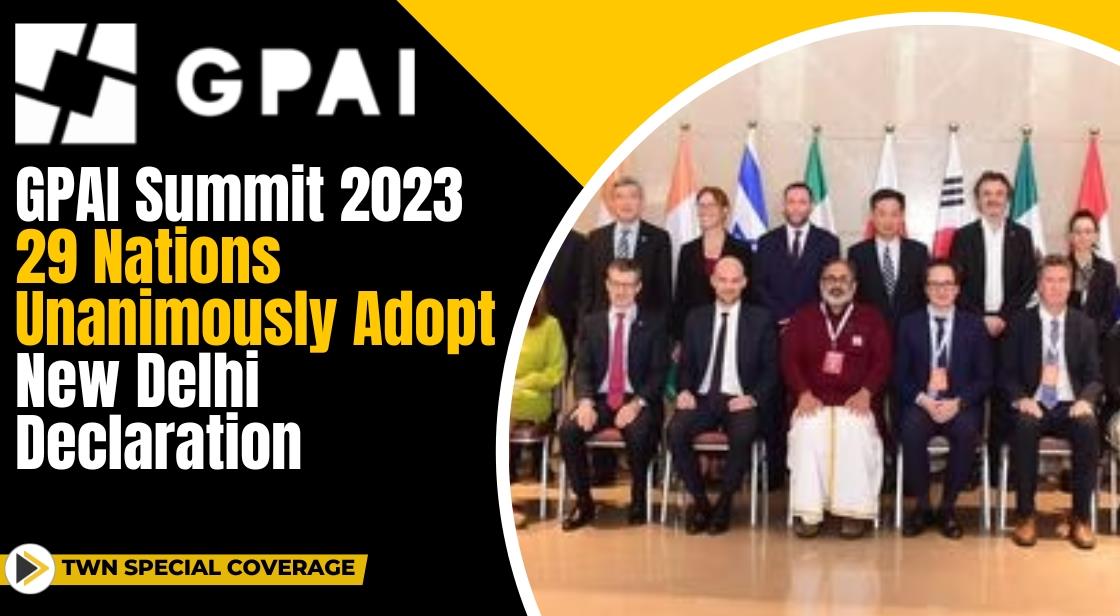GPAI Summit 2023: 29 Nations Unanimously Adopt New Delhi Declaration

News Synopsis
Minister of State for Electronics and IT, Rajeev Chandrashekhar, announced the pivotal adoption of the New Delhi Declaration by 29 GPAI partner countries during the summit. The declaration focuses on collaboration, inclusion, and a robust governance framework for artificial intelligence (AI).
Principles of the New Delhi Declaration
The New Delhi Declaration, aimed at positioning GPAI at the forefront of AI innovation, emphasizes collaboration among partner nations. It focuses on applying AI in critical sectors like healthcare and agriculture while fostering collaborative AI ventures between nations.
Inclusive Nature of GPAI
Minister Chandrashekhar highlighted the inclusive nature of GPAI, aiming to extend AI benefits to countries globally, particularly in the global south. The elevation of Senegal to the steering committee showcases India's commitment to expanding GPAI during its upcoming presidency.
Plans for Global AI Governance
Amidst discussions, the GPAI agreed to establish broad principles over the following months, fostering mid-term sittings to discuss targets and principles. Notably, Japan announced the approval of a GPAI expert center in Tokyo, the first in Asia.
India's AI Initiatives and Vision
India plans to develop AI computing capacity by early next year, enabling startups and researchers to utilize this resource. Emphasizing trusted access to Indian datasets, the government aims to curb misuse while promoting responsible AI utilization.
AI Talent Development and Urgency
During panel discussions, Minister Chandrashekhar stressed the urgent need for global collaboration on AI principles. He highlighted the impending talent deficit, emphasizing joint efforts among academic institutions, tech industries, and governments.
H4: Towards a Comprehensive AI Ecosystem
Chandrashekhar underscored the need for cohesive efforts among academic institutions and industries in India, Japan, and the UK to bridge the imminent talent gap in the AI landscape.
Key Takeaways of GPAI:
-
29 member countries of the Global Partnership on Artificial Intelligence (GPAI) unanimously adopted the New Delhi Declaration on Day 2 of the ongoing summit.
-
The Declaration focuses on collaboration, inclusion, and creating a governance framework for AI.
-
India will create AI computing capacity for startups and researchers by early January 2024.
-
Access to data will be restricted to "trusted and safe" models.
-
Global agreement on AI ground rules expected in the next 6-9 months.
-
Collaboration between academic institutions, tech industry, and governments crucial for talent development.
Unanimous Adoption of the New Delhi Declaration:
-
The Declaration was adopted after a 4.5-hour ministerial council meeting.
-
It aims to position GPAI at the forefront of shaping the future of AI, fostering collaboration, and creating AI applications in healthcare, agriculture, and other areas.
-
The full details of the Declaration haven't been made public yet.
Inclusive Nature of GPAI:
-
Senegal was elevated to the GPAI steering committee on Day 2.
-
India aims to further expand GPAI during its presidency in the coming year.
-
The focus will be on including countries of the global south and making the benefits of AI accessible to everyone.
AI Computing Capacity for Startups and Researchers:
-
The government will create public and private computing capacity for AI research and development.
-
This initiative aims to address the limited access to powerful computing resources for Indian companies.
Data Access Restrictions:
-
Access to Indian data will be restricted to "trusted and safe" models.
-
This is a response to concerns about data misuse by certain countries.
Global Agreement on AI Ground Rules:
-
India expects an agreement among like-minded countries on basic AI principles within the next 6-9 months.
-
This process began in Hiroshima, Bletchley, and the GPAI summit, culminating in South Korea.
Talent Building for the AI Ecosystem:
-
India, UK, and Japan need to collaborate to address the upcoming talent deficit in the AI sector.
-
Academic institutions, tech industry, and governments need to work together to develop the required talent pool.
Conclusion:
The GPAI summit witnessed significant strides towards inclusive AI governance, marked by the unanimous adoption of the New Delhi Declaration. With plans for AI computing, trusted dataset access, and a focus on talent development, nations are gearing up to shape a robust AI ecosystem.









